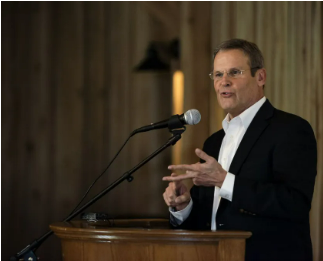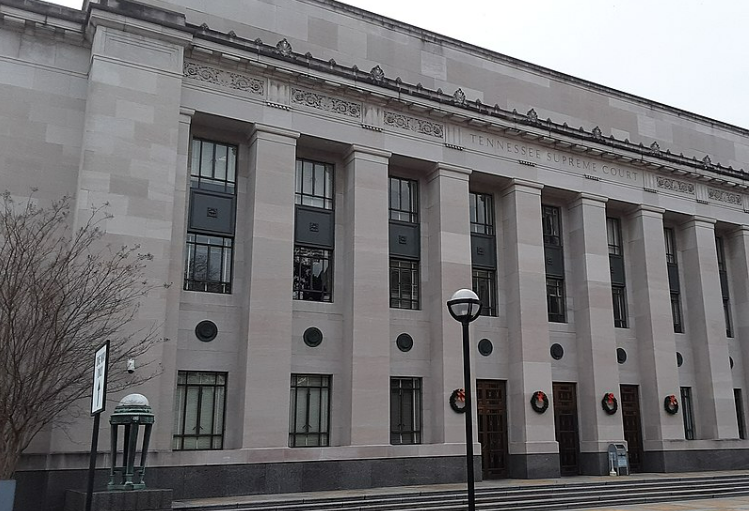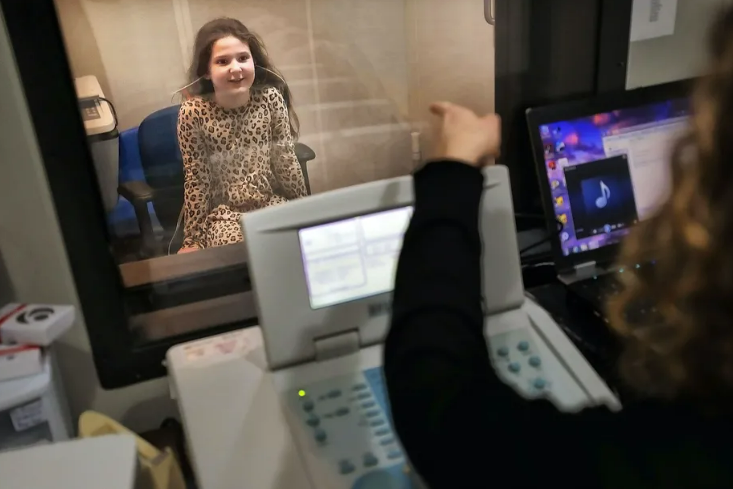
Tennessee’s education savings account program, championed by Gov. Bill Lee when he was a first-year Republican, narrowly passed in 2019 with some opposition from Republicans and almost all Democrats.
Editor’s note: This article appeared Monday on nashvillescene.com.
Tennessee’s private school voucher program cleared another legal challenge on Wednesday. The Davidson County Chancery Court ruled in favor of the education savings account program and dismissed legal claims related to it.
The ESA program, which was championed by Gov. Bill Lee and narrowly passed in 2019, allows certain students in Nashville and Memphis to use public dollars to attend private schools.
The program was initially challenged in 2020, before it had been instituted. Since then, ESAs saw several rounds of litigation before the program was green-lit to move forward in July. Following that ruling, the state rapidly began implementing the program for the 2022-23 school year.
Wednesday’s decision, which followed a September hearing, considered arguments from Davidson and Shelby counties and parents against the state and other ESA supporters — multiple lawsuits were consolidated in this case. The plaintiffs argued that the program violates the equal protection and education clauses of the state constitution, and that each city would be harmed from the loss of education-related funding that would occur when students drop out of public schools and go to private schools.
The defendants argued that the claims are not yet ripe, since a state “school improvement fund” would pay back the lost funding to the affected counties for three years.
To continue reading, click here.

Tennessee Gov. Bill Lee answers questions at a town hall meeting in July attended by Memphis-area private school leaders. PHOTO: Samantha West/Chalkbeat
One month after the launch of an online portal that provides some Tennessee families with educational options including funding to send their children to private schools, Gov. Bill Lee is giving the program high marks.
About 600 students in two Tennessee counties, Davidson and Shelby, have applied for an education savings account; 60 have been approved.
Their path toward program eligibility has been circuitous.
Davidson and Shelby county governments sued in wake of the legislation’s passage, saying education savings accounts violate the state constitution’s home rule provision. A trial court and the appellate court ruled in their favor, but the state Supreme Court overturned those decisions, allowing the program to move forward.
At the time, school choice supporters, including Tennessee Sen. Brian Kelsey, cheered the high court’s ruling.
“This is a wonderful opportunity for low-income children in Memphis and Nashville,” Kelsey said. “They will get scholarships with as much as $7,000 or $8,000 dollars a year to go to a school of their choice that will accept them, and that includes private schools. So, it’s really a thrilling opportunity for these students and parents.”
With the program being the centerpiece of his 2019 legislative agenda, Gov. Lee celebrated the Supreme Court’s 3-2 decision.
“Every child deserves a high-quality education, and today’s Tennessee Supreme Court opinion on ESAs puts parents in Memphis and Nashville one step closer to finding the best educational fit for their children,” said Lee’s statement.
But Lee’s plan to offer school choice still divides those who are committed to improving education in Tennessee.
“I was very disappointed with the court’s decision,” Memphis-Shelby County School Board chairwoman Michelle Robinson-McKissack said. “I just don’t believe public taxpayer dollars should be going to pay for someone else’s private school education.”
Among the 600 students who applied for an education savings account, Lee said, is a child whose father recently died.
“Another student who applied is in foster care and life just hasn’t been easy for him,” Lee said. He dreams of becoming a veterinarian and he thinks he would benefit from a smaller class size, and he should have that benefit.”
Tennessee has long been a battleground in what has become a national fight between those who are in favor of using taxpayer money to give parents more education choices and others who claim doing so diverts money from public schools.
Among allies in Lee’s fight to move forward on education savings accounts has been the American Federation for Children, which organized a meeting in July between the governor and about 45 private school leaders from the Memphis area.

Opponents of Tennessee’s education savings account pilot program have filed another injunction to temporarily halt the program, impacting the state’s two largest school districts two weeks before the academic year starts.
Editor’s note: This article appeared last week in K12dive.com.
While Tennessee works to reinstate its education savings account pilot program for the state’s two largest school districts, opponents have filed another motion for an injunction to temporarily stop the program two weeks before the 2022-23 school year starts.
The program would allow students in only three districts — Shelby County, Metro Nashville, and the Achievement School District — to use state and local funding toward tuition and other expenses to attend an approved private school, according to the motion. Other jurisdictions in the state are not included in the pilot school voucher-type program.
Enacted in 2019, the program provides about $8,192 for private school or other educational expenses in each ESA account. Families will be eligible for ESAs covering up to 5,000 students for the 2022-23 school year, according to the
Tennessee Department of Education. The program is limited to students from low- and middle-income households.
A previous two-year injunction on the program was lifted July 13. Now the new motion, filed July 22 by local governments in Metro Nashville, Davidson County and Shelby County, claims the ESA program is unconstitutional because it only applies to two districts in the state.
The motion alleges that the program imposes vouchers “at the financial expense of the counties that fund them and at the educational expense of the districts and the students that remain in them.”
To continue reading, click here.

Zion Christian Academy in Columbia, Tennessee, is one of more than 520 private schools in the state serving more than 100,000 students. The academy allows middle school students to experience a challenging curriculum that focuses on language arts, literature, mathematics, science, history and the bible to prepare them for high school college prep programs.
Editor’s note: This article appeared last week on Tennessee’s wate.com.
Tennessee Gov. Bill Lee says over 42 independent schools across the state are committed to making seats available immediately for students enrolled in the state’s education savings account program, and around 600 families have already started the application process.
Tuesday, Lee met with school leaders he said are interested in helping parents find the best educational fit for their children.
“We’ve only been at this a week,” Lee said. “We have about 600 applications of families that have a desire, an intent of interest, an application of interest. So, there are hundreds of families and dozens of schools, and that’s very encouraging to me.”
Last week, a Davidson County Chancellor lifted an injunction allowing the governor’s office to move forward with the pilot program. The controversial program would allow parents in Memphis and Nashville to enroll in the ESA to allow their children to attend private schools in those counties using public funds.
The plan proposed by Lee and enacted in 2019 would cost an estimated $125 million over five years and allow 5,000 students in certain low-income school districts to receive up to $7,300 to pay for approved expenses.
“We certainly hope there are no more delays. There has been a two-year delay, but it’s made its way through the court system all the way to the Tennessee Supreme Court, and they found it to be constitutional and appropriate,” Lee said. “We feel very confident it will go forward.”
To continue reading, click here.

Tennessee Gov. Bill Lee announced Wednesday that he and his team will work to help eligible parents enroll their children in the schools of their choice for the upcoming school year.
Editor’s note: This article appeared Wednesday on tnchalkbeat.org.
Tennessee can resume work on its mothballed private school voucher program after a judicial panel lifted a 2-year-old order blocking it.
On Wednesday, a three-judge panel cleared the way for Gov. Bill Lee’s education savings account program to proceed in Memphis and Nashville based on the recent Tennessee Supreme Court ruling upholding the 2019 voucher law.
Now the question is how quickly the state can roll out vouchers to provide eligible families with taxpayer money to attend private schools or to pay for private education services.
In a statement, the governor said his administration will work “starting today” toward enrolling eligible students for the upcoming school year.
And at a court hearing on Wednesday, one of the state’s lawyers suggested Tennessee would pursue a launch soon, even as school starts next month, and the law still faces other legal challenges.
A spokesman for the state education department declined to give a timetable but said the state “is excited to restart work to plan for implementation of the ESA program.”
The voucher program, which originally was to start in the fall of 2020, was the signature legislation of Lee’s first year in office after he had campaigned to give parents more choices for their children’s education. But it has been mired in legal battles for almost three years and has yet to provide a single student with voucher funds.
To continue reading, click here.

Tennessee Gov. Bill Lee has sought more education choices for parents since taking office in 2019.
Editor’s note: This article appeared Friday in Chalkbeat Tennessee.
Three years after squeaking through the legislature, Tennessee’s controversial private school voucher law has yet to provide a single eligible student with public funding to pay for private schooling — a record that will be difficult to change this fall.
Despite a favorable ruling this month by the state’s highest court, Gov. Bill Lee’s administration must clear numerous legal and logistical hurdles before launching his mothballed Education Savings Account program.
The state Supreme Court’s ruling on May 18 invalidated one of the claims brought by opponents of the law. But litigants behind one of two lawsuits in the case say they intend to press ahead with up to four remaining claims challenging the law’s constitutionality. And plaintiffs in the other suit are considering a similar move.
Equally important, a program with the complexities of vouchers cannot be rolled out in short order. The state education department must process applications from potentially thousands of families — each involving an average of 12 interactions with the applicant, according to court documents.
It must revisit its roster of dozens of private school participants and put processes in place to oversee the spending of millions of taxpayer dollars — all in alignment with the school year that, in Tennessee, generally begins in early August.
To continue reading, click here.

Editor’s note: This news release was issued earlier today by the state of Tennessee courts system.
In an opinion released today, the Tennessee Supreme Court determined that, while two Tennessee county governments had standing to challenge the Education Savings Account Pilot Program (the “ESA Act”), the Act is not rendered unconstitutional by the Home Rule Amendment, article XI, section 9, of the Tennessee Constitution.
In 2019, the Tennessee General Assembly enacted ESA Act. The Act establishes a program allowing a limited number of eligible students to directly receive their share of state and local education funds, which would ordinarily be provided to the public school system they attend, to pay for a private school education and associated expenses.
The Metropolitan Government of Nashville and Davidson County, Shelby County Government, and Metropolitan Nashville Board of Public Education filed a declaratory judgment action that named as defendants Governor Bill Lee, the Tennessee Department of Education Commissioner, and the Tennessee Department of Education.
The trial court also allowed additional parties to intervene and participate as defendants. The complaint alleged that the ESA Act violates several provisions of the Tennessee Constitution, including the Home Rule Amendment, the equal protection clauses, and the education clause.
Defendants filed separate motions challenging Plaintiffs’ standing to pursue the claims presented and the legal sufficiency of those claims. Plaintiffs, in turn, filed a motion for summary judgment with respect to their Home Rule Amendment claim. The trial court determined that the two county plaintiffs had standing to pursue the claims, but it dismissed the Metro School Board as a plaintiff for lack of standing.
The trial court also granted the motion for summary judgment concluding that the ESA Act violates the Home Rule Amendment and enjoined the State from implementing the Act. The trial court reserved ruling on Defendants’ challenges to the equal protection and education clause claims.
The trial court granted Defendants permission to seek an interlocutory appeal, and the Court of Appeals granted Defendants’ applications for appeal. The intermediate appellate court affirmed the trial court, holding that Metro and Shelby County had standing to challenge the ESA Act under the Home Rule Amendment and that the Act was unconstitutional pursuant to the Home Rule Amendment.
The Tennessee Supreme Court granted Defendants’ applications for permission to appeal. Because it is an interlocutory appeal, the issues before the Court were limited to the constitutionality of the ESA Act under the Home Rule Amendment and Plaintiffs’ standing to bring that challenge. The Supreme Court agreed with both the trial court and the Court of Appeals that Plaintiffs Metro and Shelby County had standing to bring their Home Rule Amendment Claim.
However, the Supreme Court, after reviewing the applicable constitutional language, held that the ESA Act is not rendered unconstitutional by the Home Rule Amendment because the Act is not “applicable to” the Plaintiff counties for purposes of the Amendment. The majority concluded that the ESA Act is not applicable to the Plaintiff counties because the Act regulates or governs the conduct of the local education agencies and not the counties. Thus, the Act does not violate the Home Rule Amendment. The Supreme Court therefore affirmed, in part, and reversed, in part, the judgment of the Court of Appeals and remanded the case to the trial court for the dismissal of the Home Rule Amendment claim and for consideration of Plaintiffs’ remaining claims.
Justice Sharon G. Lee and Justice Holly Kirby joined in a separate opinion, concurring in part and dissenting in part. They agreed with the Court that Metro and Shelby County had standing to challenge the ESA Act but concluded that the Act violates the Home Rule Amendment. In their view, the ESA Act substantially affects Metro and Shelby County’s ability to self-govern and decide school funding issues.
Under the ESA Act, only Metro and Shelby County and no other counties in the state must pay for students who leave public schools and use their vouchers for private school tuition. Because the ESA Act is local in effect and application, and because the Act gives Metro and Shelby County no choice in the matter, it violates the Home Rule Amendment.
To read the majority opinion in Metropolitan Government of Nashville and Davidson County, et al. v. Tennessee Department of Education, et al., authored by Chief Justice Roger A. Page, and the separate opinion authored by Justice Sharon G. Lee, visit the opinions section of TNCourts.gov.

Gigi Benassi, a moderately deaf student in Tennessee whose family participates in a state scholarship program for private education services, gets a hearing test. New legislation will greatly expand the number of students eligible for the program. PHOTO: Jim Weber
About 36,000 more students in the Volunteer State could soon get access to education choice scholarships that will allow parents to customize their learning.
The Tennessee General Assembly voted Monday to expand the state’s Individualized Education Account program to include students with dyslexia with the House of Representatives voting 69-21 in favor of the bill, which previously passed the Senate 24-7. The bill now heads to Gov. Bill Lee, who is expected to sign it in the coming days.
“The Tennessee House voted tonight to put students over systems,” said John Patton, state director of the American Federation for Children —Tennessee. “Adding students with dyslexia to the Individual Education Savings Account program will give families tools and support to seek a quality education suited to their needs. We are grateful to Pro Tempore Ferrell Haile and Chairwoman Debra Moody for sponsoring this important legislation.”
The state established the program in 2015 for students with certain unique abilities including autism, hearing and vision impairments, and traumatic brain injury to use education funds in the private school their parents chose to best serve their needs. The first awards were made in January 2017.
Eligible students receive about $7,800 in funding each year to use toward tuition, tutoring and therapies. The program currently serves 284 students, less than 1% of students currently eligible statewide.
Dyslexia was part of the 2015 bill but ended up being excluded as part of a compromise to get the legislation passed. If the new bill becomes law, officials estimate that about 250 newly eligible students would opt to participate during the first year.
Education choice has been controversial in Tennessee as in other states where the fight continues over whether to give parents more education choices. Also ongoing in Tennessee is a battle over a 2019 law to create a separate education savings account program that would offer broader flexibility to parents in Memphis and Nashville districts.
A Nashville judge declared the program unconstitutional. The state has appealed and is awaiting a ruling from the Tennessee Supreme Court.
 John Huppenthal and John Deasy
John Huppenthal and John DeasyJohn Huppenthal is the Arizona Superintendent of Public Instruction. John Deasy is the Superintendent of the LA Unified School District. They’re both leaders of public education.

Huppenthal
They’re also big supporters of school choice.
Huppenthal participated in a phone campaign in Arizona that targeted low-income parents (and upset many school choice critics). The call informed parents of their right to choose a private or public school through the state’s Empowerment Scholarship Accounts program.

Deasy
Meanwhile, Deasy spoke at the School Choice Week rally in L.A. and told the crowd, “We believe that every single family and student has the right to a choice of a highly effective school in Los Angeles.”
These two men represent a “new guard” of education leadership that sees public education in a better way. To them (and many others), public education is not a destination, but the idea that the public helps children find the best possible education, wherever that might be.
 Alabama: The Institute for Justice, a national civil rights law firm, says vouchers are constitutional in the state (Al.com).
Alabama: The Institute for Justice, a national civil rights law firm, says vouchers are constitutional in the state (Al.com).
Alaska: School choice opponents voice their concerns at a public hearing over a constitutional amendment to allow public funding of private schools (Anchorage Daily News, Nonprofit Quarterly). The proposed constitutional change passes the House Education Committee but the amendment faces a tough road ahead (Anchorage Daily News). There are 27 charter schools in the state with no cap on how many schools may operate (Alaska Dispatch).
Arizona: The state has many school choice programs (Camp Verde Bugle). A state court rules the Department of Education cannot recoup $5.9 million in over-payments to charter schools due to a change in teacher performance pay because it didn't notify the schools of the rule change (Arizona Republic). Charter school operators plan to open 25 new charter schools in Phoenix (Arizona Republic).
California: Parent trigger elicits emotions from parents on both sides (Hechinger Report). The superintendent of LA Unified says every "student has the right to a choice of a highly effective school" (Reason Magazine). San Diego school board members are attempting to exclude some charter schools from receiving bond money approved by city voters (Fox 5 San Diego).
D.C.: A new study reveals area charter schools are being shortchanged on student funding compared with district schools (Washington Post).
Florida: School choice is growing by leaps and bounds (Sunshine State News). The Palm Beach Post editorial board says giving students public school choice could reduce the disadvantages faced by low-income students. After 17 years as president and CEO of Florida Virtual School, Julie Young announces her retirement (redefinED, Orlando Business Journal). Gov. Rick Scott proposes allowing charter schools access to construction funds if they serve students within attendance zones of low-performing public schools (Tallahassee Democrat).
Georgia: A lawmaker wishes to expand the tax credit scholarship program with a $100 million cap (GPB News).
Illinois: Nobel charter schools name thee schools after donors who give $1 million or more, but the donors do not decide curriculum or which teachers to hire (Chicago Sun Times).
Indiana: The Lafayette Journal & Courier editorial board argues that private schools should continue to take the state test in order to create a fair comparison with public schools. Since vouchers can be worth no more than 90 percent of per-pupil state funding to local school districts, vouchers save the state money (Indianapolis Daily Star). Five voucher schools in the state say they teach intelligent design or creationism (Journal-Gazette). The Star Press editorial board worries that allowing students to use vouchers without ever attending public school creates two classes of education. (more…)